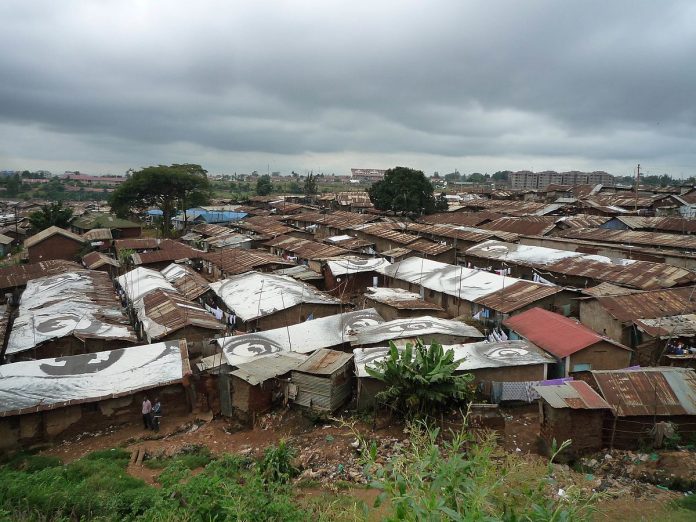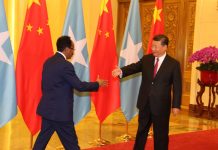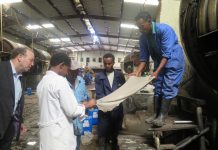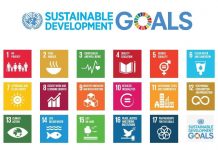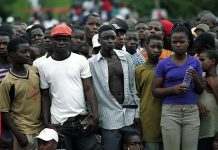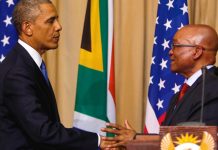On March 5, as the African Union prepared for its 50th anniversary celebrations, Chika Onyeani, publisher and editor-in-chief of the U.S.-based newspaper, The African Sun Times, interviewed Her Excellency Dr. Nkosazana Dlamini-Zuma, chairperson of the African Union Commission, at her office in Addis Ababa, Ethiopia. In her edited remarks below, Dlamini-Zuma identifies Africa’s “core” problem and outlines ways in which that problem should be addressed in order to move the continent into a “high-development index” in the next 50 years.
Africa’s problem is underdevelopment and poverty. I think those are the core issues that need to be addressed in the next few decades, and I think they need to be addressed in a variety of ways.
We have this huge population of young people. So, it means we have to put human development at the center, education, health, and we need to create jobs and we have to increase our agricultural output.
We have a lot of arable land in Africa that is under-utilized. And yet we keep importing food from outside. So, it is important for us to increase our agricultural output. We need to have food security and export, and we need to have agricultural products to industrialize as well. We need to grow our agro-industries in some of our countries.
It is also important for us to beef up our infrastructure for integration, to connect us for true authority and generally for our connectivity and African growth. Telecommunications infrastructure especially – it is better now that we have the under-sea cable around Africa from east to west. Now, we need to get the necessary connectivity to the countries that are not on the coasts of Africa. It is important that they do have broadband as well.
We need to have energy because we cannot develop without energy. Energy is very critical. And it is important that we utilize our natural mineral resources in a way that facilitates industrialization, but also [provides] the resources for more development and eradicating poverty.
“Intra-African trade, as I said, is the only way of fostering infrastructure around the continent, but also of harmonizing some of the regulations.
“And of course, we can’t do all these if there is no peace. There is every need to have peace and security as well; to have democracy and good governance and respect for human rights and all that goes with it.
“And then of course, for us to do all these, we have to mobilize resources. But I think it is possible for Africa to develop, to modernize in the next 50 years. I think it is possible for Africa to develop into high-development index in the next 50 years.
“The best way of mobilizing resources is to start by mobilizing amongst ourselves first, and then going out to the donors to assist us. But the main phase of our development has to be from our own resources and I hope that is what we are going to be looking at – looking at ultimate sources of funding so that we could have money for the projects we want to accomplish.
“Also, we have to have solidarity among countries and mobilize resources not only from government, but also from private sector, foundations, and a whole variety of sources.
“The African Diaspora can be a very important catalyst for our work and I think the first thing is to try and get, in each area, a data-base of who is in the Diaspora and make sure that they can be organized wherever they are. We can also interact with them and know whatever difficulties they may be facing in the Diaspora…but at the same time know the kinds of skills they possess.
“We are starting the Pan-African University. We will be needing lecturers in various fields and they can come and lecture there maybe on a full-time or part-time basis. We are building infrastructure. A lot of them may have technical skills and some of them may even have money to invest. So, I think there is a lot that can be done together with the Diaspora. They can even assist us with funding some of the projects. They can assist us with disseminating information from wherever they are about what Africa is trying to do.
“The issue of the Sixth Region, as you know, has to be decided by member states. But from our side, as the Commission, we can work with the Diaspora with or without the Sixth Region, even before the final decision. Maybe if we work with [the Diaspora]…the issue of the Sixth Region, instead being a theoretical debate, could be woven into the fabric of working together.
Nkosazana Dlamini-Zuma Ph.D. is the first woman to chair the African Union Commission. Her entire interview with Chika Onyeani, can be viewed in The African Sun Times at http://africansuntimes.com/?s=interview+with+Nkosazana+Dlamini-Zuma.


